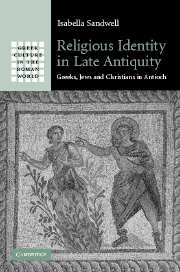Book contents
- Frontmatter
- Contents
- Preface
- List of abbreviations
- Part I INTRODUCTION
- Part II CONSTRUCTED AND STRATEGIC RELIGIOUS IDENTITIES AND ALLEGIANCES
- Chapter 3 Chrysostom and the construction of religious identities
- Chapter 4 Libanius and the strategic use of religious allegiance
- Part III RELIGIOUS IDENTITIES AND OTHER FORMS OF SOCIAL IDENTIFICATION
- Part IV RELIGIOUS IDENTITY AND SOCIAL ORGANIZATION
- Part V ASSESSING THE IMPACT OF CONSTRUCTIONS OF IDENTITY
- Bibliography
- Index
Chapter 4 - Libanius and the strategic use of religious allegiance
Published online by Cambridge University Press: 22 September 2009
- Frontmatter
- Contents
- Preface
- List of abbreviations
- Part I INTRODUCTION
- Part II CONSTRUCTED AND STRATEGIC RELIGIOUS IDENTITIES AND ALLEGIANCES
- Chapter 3 Chrysostom and the construction of religious identities
- Chapter 4 Libanius and the strategic use of religious allegiance
- Part III RELIGIOUS IDENTITIES AND OTHER FORMS OF SOCIAL IDENTIFICATION
- Part IV RELIGIOUS IDENTITY AND SOCIAL ORGANIZATION
- Part V ASSESSING THE IMPACT OF CONSTRUCTIONS OF IDENTITY
- Bibliography
- Index
Summary
LIBANIUS' LABELLING AND DEFINITION OF RELIGIOUS ALLEGIANCE
References to religious allegiance are the exception rather than the rule in Libanius' writings. He wrote orations and letters on a whole range of topics including education, social reform (on behalf of prisoners and peasants, for example), civic life and imperial administration, almost without mentioning religious issues in any significant way. Libanius' sense of himself as someone who adhered to traditional religion simply did not impose on these matters in a consistent way and was rarely something he thought relevant to mention. Against this background, the examples where Libanius does mention religious allegiance and does explore religious difference are striking. The largest body of Libanius' writings that give a central place to religious issues are the Julianic orations (particularly Oration 13 An Address to Julian and Oration 12 An Address to the Emperor Julian as Consul written during Julian's stay in Antioch (the latter at the emperor's request); and also Orations 17 The Lament over Julian; 18 The Funeral Oration; and 24 On Avenging Julian) and the letters written during and around the reign of Julian. Julian sought to restore Graeco-Roman religion as the state-sponsored religion, to convert people back from Christianity and to emphasize the most visual features of Graeco-Roman cult practice, such as blood sacrifice, which meant that Libanius was forced to discuss religious issues.
- Type
- Chapter
- Information
- Religious Identity in Late AntiquityGreeks, Jews and Christians in Antioch, pp. 91 - 120Publisher: Cambridge University PressPrint publication year: 2007



